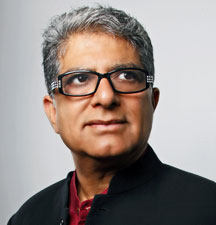
There is enormous interest in power, and especially personal power, which holds the key to every kind of success and achievement. Yet there’s a problem with how we approach personal power.
Despite the poet William Wordsworth’s warning that “we murder to dissect,” we analyze power by cutting it up in bits and pieces, trying to tease out the relevant factors from the immensely complex issues open to question.
You can examine power as a product of the mind (some people come up with impressive new ideas that have an enormous impact), the product of the brain (some people seem to be hard-wired for great decision-making), or the product of genes (some people have won the DNA lottery, it seems).
But what if the whole is much bigger than the sum of the parts? This certainly must be true when it comes to personal power, because it’s the totality of the person who matters.
We call this a “top down” approach, which considers wholeness first, rather than the reductionism of dissecting the whole into the tiniest parts, which is a “bottom up” approach.
You are the product of mind, brain, and genes acting in concert – that much is undeniable – so the big question is “How do they cooperate? What organizes them into a unity rather than as separate parts?”
An emerging field known as systems biology has begun to ask top-down questions like these, because the way we experience life is not reductionist. Instead, we experience the following:
A flow of events matched with a flow of thoughts, sensations, and feelings. A state of constant change that is matched with a state of balance and non-change. A body where trillions of cells communicate and cooperate constantly.
A pervasive intelligence that diversifies into mind, brain, and gene, but which can be described by itself as “consciousness.”
When these experiences are taken as the starting point of life, a radical change occurs in the way we live. We find it possible – and very necessary – to promote the whole human being, and to do that, the most powerful approach works at the source.
If mind, brain, and genome are organized at the level of consciousness, which is what a top-down perspective declares, then the ultimate personal power lies at the level of consciousness.
There is exciting new data from many quarters to support this conclusion. They indicate, to begin with, that familiar lifestyle changes in diet, exercise, stress management, attitude, and meditation reach all the way down to our genes.
Some studies have already spotted hundreds of change in genetic output when positive lifestyle changes are made. This number extends to thousands when meditation alone is intensely studied, and the alterations can occur very quickly, in the first few meditations rather than over years of practice.
Twenty years ago the mind-body connection was intriguing but not necessary in the view of most biologists, psychologists, and physicians.
Now we understand that nothing is more necessary; indeed, if you want to care for yourself in the optimal way, it’s the mind-body-brain-gene connection that matters. The top-down approach promises to bring about a quantum leap in self-care, which we call “radical well-being,” the most exciting prospect in wellness to come along in decades.
Even more promising is the prospect of solving the so-called “hard problem” of how mind and brain are related. The reductionist position, embraced by all materialists (or physicalists to use the current term), is that the brain creates the mind.
Just as insurmountable is a second obstacle: No one can explain how brain activity, which is entirely electro-chemical, produces the sight, sound, smell, taste, and texture of a three-dimensional world. There is no light in the brain and no sound, yet somehow the world emerges replete with color and noise.
Excerpted from deepakchopra.com. The 67th birth anniversary of Deepak Chopra was observed on October 22
Deepak Chopra






